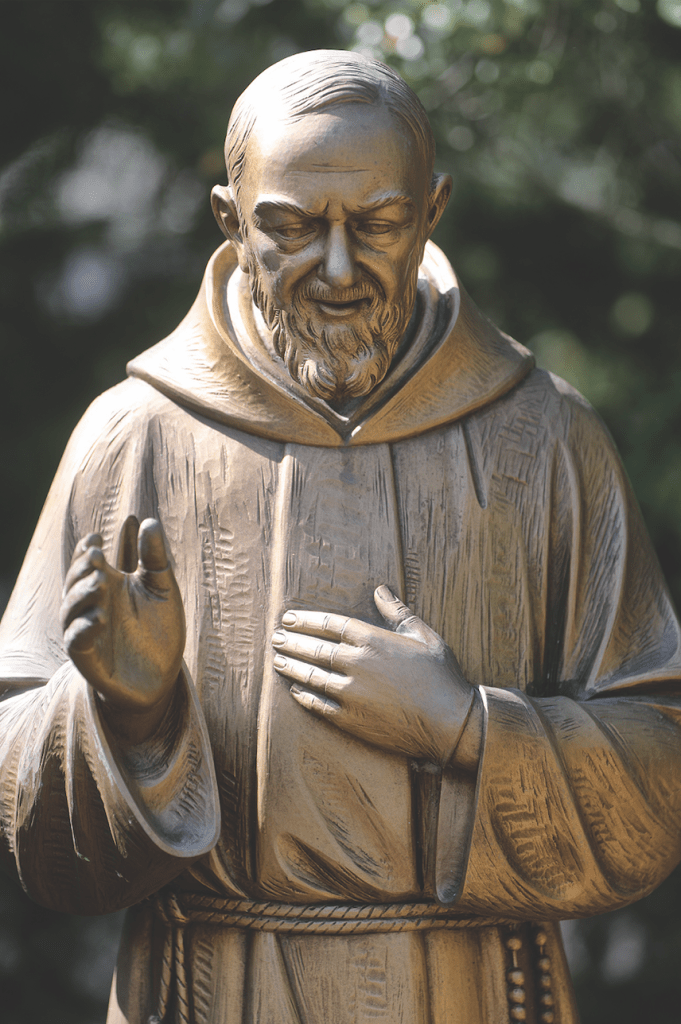
by Archbishop Joseph F. Naumann
The date of the publication of this week’s Leaven coincides in the church’s liturgical calendar with the feast of St. Pius of Pietrelcina, more popularly known as Padre Pio.
People came from all over the world to go to confession to Padre Pio and to participate in a Mass celebrated by this humble Franciscan friar. Padre Pio frequently entered into deep contemplation of the mystery of the crucified Jesus during the celebration of Mass. The Masses that he celebrated could last more than two hours.

The patroness for our archdiocese is Mary under her title of the Immaculate Conception. Our secondary patron is St. John Mary Vianney, who is also the patron for priests. John Vianney came of age during the French Revolution. As a young boy, he attended with his family clandestine Masses celebrated in the middle of the night in barns. If government authorities discovered the celebration of these secret Masses, both the priest and the congregation would be executed.
In the early part of the 19th century, when the recently ordained priest — John Vianney — arrived at his pastoral assignment, St. Sixtus Church in the small, humble town of Ars, most of the 230 residents came to Mass to evaluate their new pastor, but very few received holy Communion. The next Sunday, very few showed up for Mass.
The future saint made his first priority helping his parishioners recover an appreciation of the proper observance of Sunday, the Lord’s Day. He did not wait for parishioners to show up for Mass but sought them out working in their fields or carousing in the taverns, engaging them in conversation and challenging them to make Sunday the most important day of the week by making participation in Mass the heart of their Sunday.
Many of his parishioners did not appreciate his efforts to get them to reconsider how they spent Sunday. Some of his critics authored a petition asking the bishop to replace Father Vianney because of his poor preaching and his persistent and demanding pastoral style. One of his supporters brought Father Vianney a copy of the petition. He read it carefully and then signed it. Fortunately, the bishop wisely did not replace Father Vianney.
Eventually, Father Vianney’s persistence had its desired effect. Gradually, most of the town’s people began coming to Sunday Mass.
Next, John Vianney began to catechize his parishioners about the importance and meaning of the Mass. He taught his parishioners that the Mass is a true sacrifice, making present to believing hearts the most important event in human history, as well as the greatest act of heroic love — Jesus giving his life on Calvary for us, for sinners.

At Mass, we are invited to place on the altar not just bread and wine, but our own imperfect efforts to follow Jesus along the pathway of heroic love. Husbands and wives offer their efforts to sacrifice their own wants and desires for the good of their spouse, as well as for the good of their children.
Whatever our state of life or vocation, active participation in the sacrifice of the Mass involves uniting our humble and imperfect acts of sacrificial love with the most perfect act of love in all of human history: Our Lord’s gift of himself on Calvary.
Father Vianney, also known as the Curé of Ars, then fostered in his parishioners an understanding and awareness of the real presence of Jesus in the Blessed Sacrament.
One Sunday, Father Vianney’s entire homily consisted in repeating the sentence with tears streaming down his face and pointing toward the tabernacle: “He [Jesus] is there!” He urged his parishioners to come to church any time of the day or night to pray in the presence of the eucharistic Lord.
The Curé of Ars, constantly striving to foster within the hearts of his people profound eucharistic devotion, reminded his flock that Jesus was available to them any time of the day or night.
Finally, Father Vianney encouraged his parishioners to receive holy Communion as frequently as possible — not just every Sunday, but daily as well. St. John Vianney was famous for spending more than 12 hours each day in the confessional, making this sacrament of mercy available to his people.
By the end of his pastoral ministry in Ars, the French railway had added additional trains coming to Ars to accommodate the thousands of pilgrims descending on this tiny town to receive the sacrament of God’s mercy from this extraordinary confessor. Not only was St. Sixtus Church in Ars filled with people on Sunday morning but also for the 7 a.m. daily Mass.
As we embark on the implementation in northeast Kansas of the three-year national pastoral initiative aimed at renewing in our hearts amazement at the heroic sacrifice of Calvary made present to us at each and every Mass, as well as deepening true love for the real presence of Jesus in the Eucharist, let us petition these two great saints — Padre Pio and St. John Vianney — to intercede for us.
Pray for me and all priests that we might follow the examples of Padre Pio and the Curé of Ars in our own personal love for the Eucharist and celebrate Mass with true devotion.
Padre Pio and St. John Mary Vianney, pray for us.


